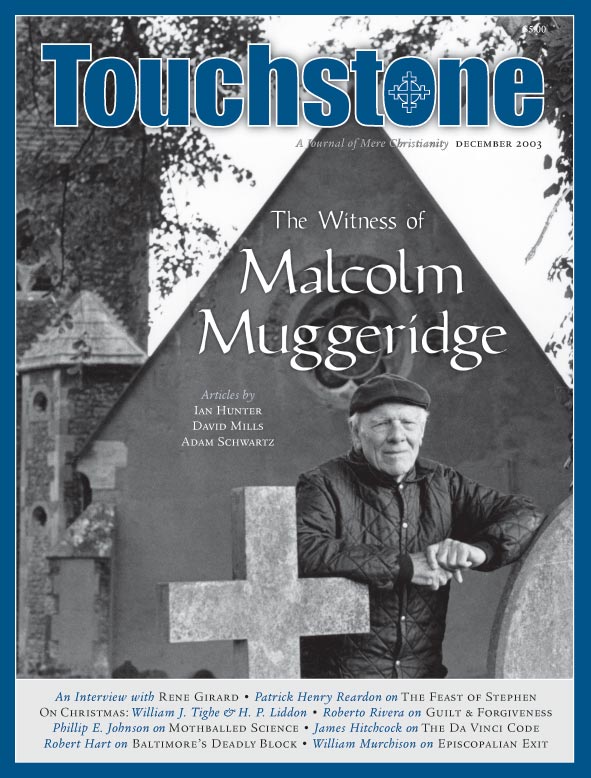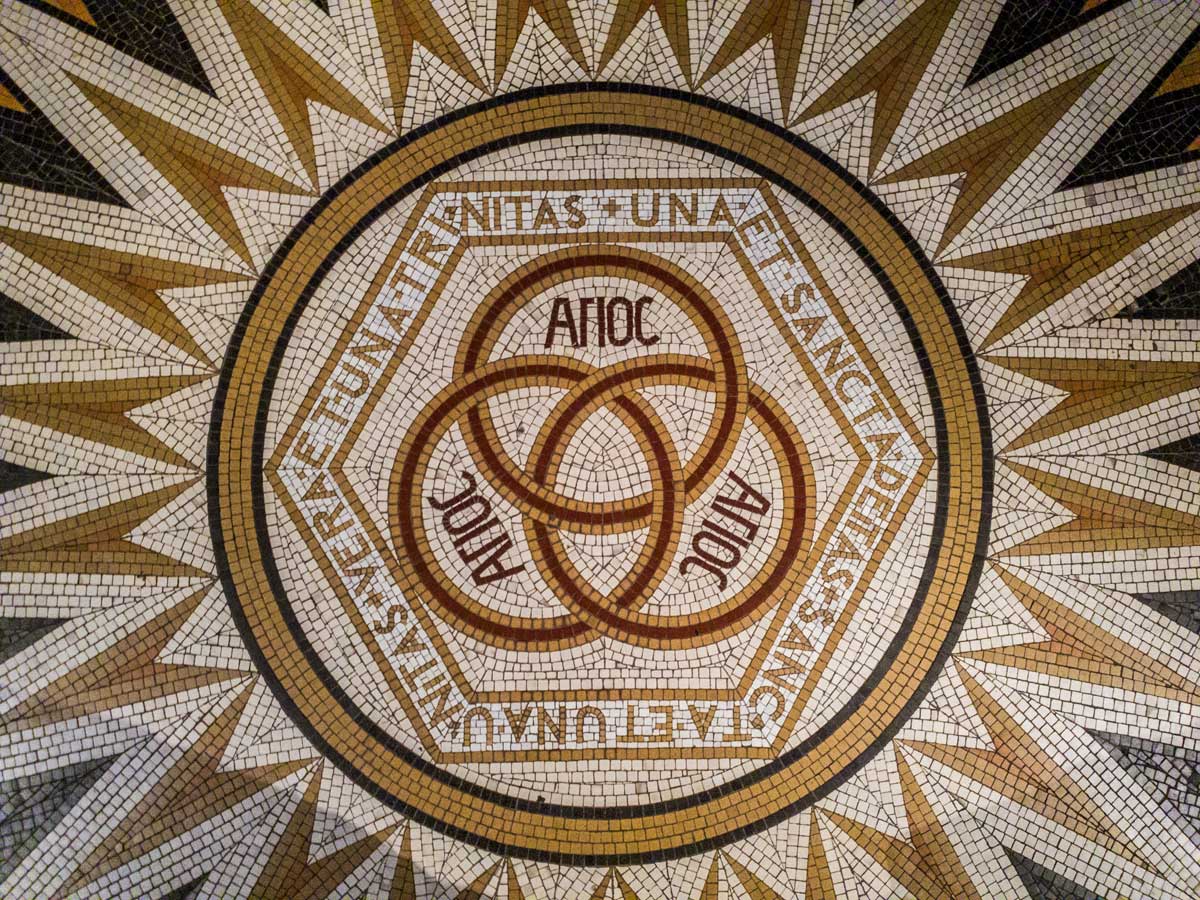Fantasy Faith
James Hitchcock on the Resurgence of Gnosticism
This past summer was “The Summer of Mary Magdalene,” according to Time magazine. One of the things that made it so was a best-selling novel called The DaVinci Code, by Dan Brown, which turned the biblical story into a thriller in which Jesus was married to Mary Magdalene, a rich woman who financed his ministry, but after his death (there being no resurrection), the apostles conspired to suppress the truth in order to maintain male dominance.
Brown’s fantasy is not without a foundation, a very shaky foundation, since some of it is taken from some early books called the Gnostic gospels, which are in many ways at odds with the four Gospels of the New Testament. The Church debated these documents in the early centuries and came to define the canon of the Bible partly to exclude these other “gospels.”
Gnosticism was an older and wider movement than Christianity, affecting Judaism and other religions as well. It was a “dualism,” in which the cosmos is thought to be composed of two irreconcilable principles: spirit or light, and darkness or matter. The universe is not created and ruled by one God, but now consists of two warring kingdoms, which will ultimately be completely separated from one another.
Gnostic is a Greek word for “knowledge,” and the Gnostics claimed to possess secret knowledge that their followers used to free themselves from the world of darkness and matter. Only an elite could know the hidden truth.
The Gnostic Vogue
There are many things in Gnosticism that the modern mind finds repellent: elitism, weird stories, peculiar rituals, and, above all, its rejection of the flesh. If orthodox Christianity is criticized for not cherishing the body, Gnosticism rejected it entirely. But Gnosticism is now enjoying a vogue, partly because it was a religion in which women held leadership roles. This was consistent with its rejection of the flesh, which made sexual identity unimportant.
“Christian” Gnostics did not accept the Incarnation of Jesus (matter being evil) and asserted that the Gospels were not to be taken at face value but as stories with hidden symbolic meanings. Thus, it was possible to write new “gospels,” since the Gnostics were not bound by what may or may not have happened while Jesus was on earth. Mary Magdalene could become Jesus’ intimate, and the New Testament could be dismissed as essentially false.
Modern people like Brown, who treat the Gnostic gospels as history, miss the point: To the Gnostics themselves it was irrelevant what actually happened when Jesus was on earth, if he ever was. But the Gnostic gospels nevertheless prove useful in advancing contemporary causes, even if modern people do not understand them as the Gnostic authors did. For 150 years, skeptics have been calling the historical reliability of the New Testament into question. But now the Gnostic gospels, which were written later and were never taken as historical documents by anyone, are treated as at last giving us a true picture of the early Church.
For example, Elaine Pagels, the best-selling scholar of Gnosticism, theorizes that Thomas is presented as a doubter in the New Testament in order to discredit the Gnostic Gospel of Thomas, a theory that rests upon the presumption that it presents the true history the church fathers wanted to suppress. There is no scholarly reason to think this, but the compatibility of the Gnostic gospels with certain contemporary concerns, and the gnostic mindset of many religious people, incline some scholars to produce such theories.
Brown’s thriller has had some impact even within Christian circles, but those intrigued by the book perhaps do not realize how much is actually being demanded of them. This is not merely another liberal “revision.” It is nothing less than the claim that Christianity has been a deliberate fraud almost from its beginning, that the true story of Jesus was suppressed, and that only now are we finally learning what it was all about.
Secularism has principally manifested itself in its effect upon morality, especially in the systematic undermining of the institution of the family. But now secularism is moving much farther and deeper, in its attempts to discredit the very foundations of the Christian faith, and it does so in particularly sinister ways, appealing to the human religious feelings that it used to deride.
For three centuries, the standard secularist criticism of the faith was simple rationalism, the denial of “things unseen.” But the bleakness of this rationalism was always apparent, and despite the rationalists’ best efforts, people have never been able to overcome the intuition that there is much more to reality than science can prove, and that the most important things, the things that make life worth living, are those reason by itself cannot see.
The Attack
In other words, the danger now is not the denial of all religion, but an actual excess of religion. Christianity is now being assaulted from two different directions, which might be called horizontal and vertical.
The horizontal attack derives from the encounter between Christianity and other religions. The neo-gnostics treat religion as something found everywhere, which cannot be “contained” within any particular tradition. The claim that salvation comes only through Jesus Christ is fundamental to Christianity, but it is precisely that uniqueness the new gnostics deny. Jesus is only one expression, and perhaps not the most useful or relevant one, of the religious impulse found in everyone. Liberal Christians now have no intellectual basis for affirming his ultimate significance.
The vertical attack reaches back into history and claims that the Christian faith was in effect a kind of fraud from the beginning, something that is implied even by certain “mainstream” biblical scholars, who with complete insouciance suggest that the early Christians invented various accounts of Jesus in order to support their political or religious agenda. Neo-gnosticism reinvents Christianity in a radical way, by finding the “real” Jesus not in the Bible but in apocryphal books admittedly written later.
The DaVinci Code can be viewed as merely an ephemeral artifact of popular culture, but its immense sales ensure that it will have influence on people who never read serious books. Brown has found a formula for becoming rich: sex, sensationalism, feminism, anti-Catholicism, and the occult. But it is also obvious that he sincerely hates Christianity and sees himself as engaged in an anti-crusade. The culture is ripe for such a debased book, so that even professing Christians are being seduced by it.
The reason for this is not far to seek. Like most things in the culture, it ultimately has to do with sex. Despite the Gnostics’ hatred of the flesh—and, truth to tell, their contempt for women in some of their gospels—the movement is presented as “life-giving.” Even professed Christians can be attracted to such a thing, because it promises to liberate them from “oppressive” sexual morality. It is an approach to religion that offers comfort without struggle, that makes no demands on the individual except credulity towards whatever fantasies the individual finds attractive.
Critics have painstakingly documented the fallacies in Brown’s book, which include both distorted history (his description of the witchcraft phenomenon) and sheer fantasy (his description of the survival of pre-Christian cults). But ultimately such debunking is irrelevant, because the neo-gnostics, like their spiritual forbears, regard history as irrelevant. But arguing against Christianity on the basis of works the neo-gnostics know to be historically spurious is an effective way of assaulting the faith of people who do not understand the game being played and who take the historical claims at face value.
Free Invention
The essence of New Age religiosity is the claim that people are free to invent whatever beliefs they choose, because religion is nothing more than the subjective emanations of one’s own soul. Millions of people read The DaVinci Code not because they necessarily believe its absurd story but because it creates a myth that serves certain emotional needs and allows them to be “religious” without submitting to any of the demands of faith.
Gnosticism attracted her, Pagels explained, because it teaches that “spirituality is essentially within oneself.” She calls herself a Christian because Christianity “offers hints and glimpses of spiritual possibility.” This is about as weak an act of faith as it is possible to make, and if such an understanding had triumphed two millennia ago, Christianity today would be nothing but a footnote in books written by historians like Pagels.
James Hitchcock is Professor emeritus of History at St. Louis University in St. Louis. He and his late wife Helen have four daughters. His most recent book is the two-volume work, The Supreme Court and Religion in American Life (Princeton University Press, 2004). He is a senior editor of Touchstone.
subscription options
Order
Print/Online Subscription

Get six issues (one year) of Touchstone PLUS full online access including pdf downloads for only $39.95. That's only $3.34 per month!
Order
Online Only
Subscription

Get a one-year full-access subscription to the Touchstone online archives for only $19.95. That's only $1.66 per month!
bulk subscriptions
Order Touchstone subscriptions in bulk and save $10 per sub! Each subscription includes 6 issues of Touchstone plus full online access to touchstonemag.com—including archives, videos, and pdf downloads of recent issues for only $29.95 each! Great for churches or study groups.
Transactions will be processed on a secure server.
more from the online archives

24.6—Nov/Dec 2011
Liberty, Conscience & Autonomy
How the Culture War of the Roaring Twenties Set the Stage for Today’s Catholic & Evangelical Alliance by Barry Hankins
calling all readers
Please Donate
"There are magazines worth reading but few worth saving . . . Touchstone is just such a magazine."
—Alice von Hildebrand
"Here we do not concede one square millimeter of territory to falsehood, folly, contemporary sentimentality, or fashion. We speak the truth, and let God be our judge. . . . Touchstone is the one committedly Christian conservative journal."
—Anthony Esolen, Touchstone senior editor








